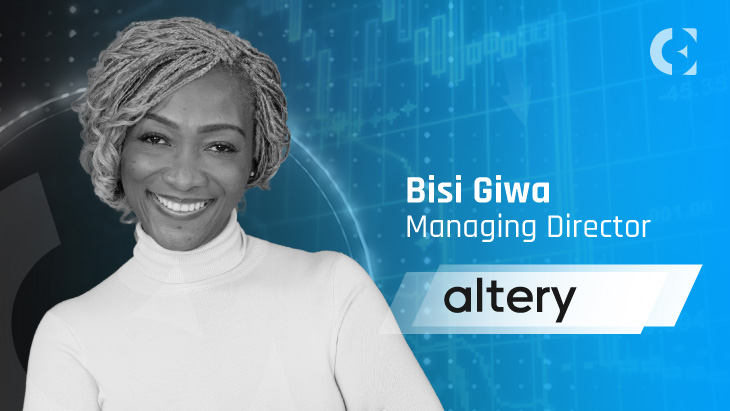Altery’s Chief Risk and Compliance Officer discusses the complexities of global fintech compliance. Coin Edition’s exclusive interview brings out how Altery has balanced out innovation with regulation, using AI and blockchain tech, and continues to protect users from financial crimes.
1. Given Altery’s operations across Europe, Africa, and Asia, how do you keep up with the various regulatory requirements to maintain a cohesive compliance strategy?
To achieve cohesion, we’ve created a structure that keeps everyone aligned through a central compliance function, local compliance leads or legal partners who monitor relevant updates and quarterly compliance forums. We’ve also implemented a compliance change register that tracks regulatory developments and internal reviews.
This helps us stay proactive rather than reactive, so that our strategy is globally consistent while remaining locally responsive.
2. As the fintech industry rapidly evolves, how do you ensure that innovation at Altery doesn’t outpace the necessary compliance frameworks?
We believe innovation and compliance go hand in hand. Every new product starts with a compliance check, right from the idea stage. Our Risk Committee helps ensure nothing goes live without the right controls in place.
We also make sure our teams know not just the rules, but the reasons behind them. That way, everyone takes ownership. And our policies? They’ve been designed to bring on new ideas like embedded finance or digital assets, without slowing us down.
For us, compliance isn’t a blocker. It’s how we build trust and grow smarter.
3. You started your career as a solicitor. How has that legal background helped you in your role managing risk and compliance?
My legal background really shaped how I see compliance, as not just a ticking box exercise but a way to balance risk, intent and what’s actually fair and defensible.
It helps me turn dense regulations into something teams can actually use. It means I can have real conversations with regulators and understand how things will play out in practice. Clarity and good judgment guide me, whether it’s formal policy writing or those grey areas.
That foundation helps me lead with structure and accountability, helping me to build trust across the business and with our regulators.
4. What strategies have you implemented at Altery to foster a company culture rooted in transparency, responsibility, and trust?
Creating culture at Altery is an important tool in a compliance program. Shaping our culture shapes how we show up in the market.
At Altery, we’ve focused on leadership modelling, clear accountability and ongoing dialogue. We don’t just ask for trust, we’re building it through predictability, fairness and listening, especially when things go wrong.
5. With the rise of technologies like AI and blockchain, how do you foresee them impacting risk and compliance functions? Is Altery prepared for these changes?
AI and blockchain are double-edged swords for compliance. On one hand, they introduce new risks, such as algorithmic bias, data misuse and decentralised anonymity. On the other hand, they offer powerful tools for real-time transaction monitoring, smart contracts and enhanced KYC and identity verification.
There are a number of ways we’re preparing, these include, an internal group of skilled resources to guide control frameworks, participation in industry consultations on AI governance and crypto regulation and inclusion of AI ethics and blockchain compliance modules in our training roadmap.
We believe staying ahead means embracing these tools responsibly and transparently, with controls that evolve alongside innovation.
6. With more people using digital services, how is Altery protecting users and preventing financial crimes?
Scaling digitally opens a lot of doors, but this also means there’s more to protect. We’ve built our financial crime framework to protect both our users and ourselves:
● We use a risk-based approach to onboarding and monitoring, in line with global standards.
● Screening covers everything from sanctions and PEPs to crypto-specific risks.
● Real-time behavioural analytics help flag anything that doesn’t look right.
● And we regularly test our fraud and takeover prevention controls to keep them sharp.
We want to provide a safe and secure experience for our users. So, we’ve made sure to be clear with them on how their data is used, provide easy tools for freezing accounts and create campaigns to help them spot scams.
7. According to you, what would be the biggest challenge or change in fintech compliance in the next five years?
One of the biggest challenges ahead is navigating fragmented global regulations, especially as digital identity, AI and cross-border compliance become more central to how fintech operates.
At Altery, we see the future as a balancing act: scaling globally while staying nimble enough to adapt locally, being transparent about how decisions are made (especially by algorithms) and preparing for the day a global standard on digital identity becomes reality.
It won’t be enough just to tick the compliance boxes, fintechs will need to build trust into everything they do, from product design to brand identity.
Disclaimer: The information presented in this article is for informational and educational purposes only. The article does not constitute financial advice or advice of any kind. Coin Edition is not responsible for any losses incurred as a result of the utilization of content, products, or services mentioned. Readers are advised to exercise caution before taking any action related to the company.







